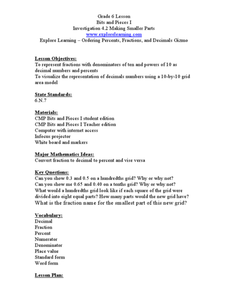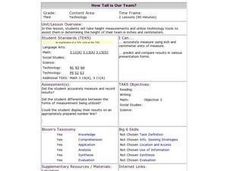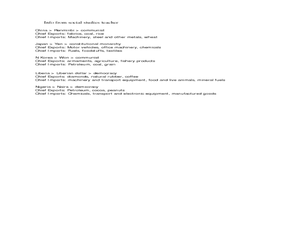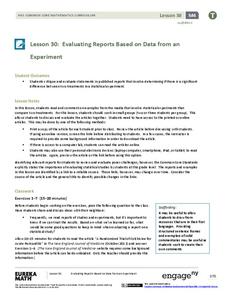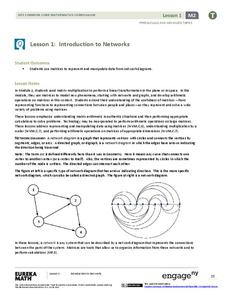Curated OER
What Can I Afford?
Students explore the concept of cell phone plans. In this cell phone plan lesson, students research the cost of cell phones. Students compare various cell phone plans and decide on which phone plan is best for them.
Curated OER
When Am I Ever Going to Use this?
Young scholars solve problems using equations and properties of integers. In this algebra lesson, students solve problems using ratio and proportion and graph their answers on a coordinate plane. They solve word problems using geometry.
Curated OER
Toothpick Tops
Students assembly tops and name them 1 - 12 so that they can compare their results. They guess which top they think will spin the best and then record data on "Toothpick Top" table. Using a stopwatch or clock to measure and record the...
Curated OER
Non-Standard Measurement
Students, using a list made up of things from around the room; estimate the distance of one of the items on the list with one unit, record their prediction, and then actually measure items with non-standard measuring devise.
Curated OER
Favorite Apple Graph
First graders record their favorite type of apple in the form of a graph. They each try one slice of a Red Delicious, Golden Delicious, and Granny Smith apple, select their favorite type, and create a class graph using the data collected.
Curated OER
Bits and Pieces I
Sixth graders examine making smaller parts out of fractions and decimals. In this online interactive fractions, decimals, and percents activity, 6th graders represent fractions with denominators of ten. Students then represent powers of...
Curated OER
Technology: Money Equivalency
First graders,working on computers, drag coins into boxes to equal amounts pictured. Following a demonstration, they demonstrate how to type number sentences. As an extension, 1st graders create equivalent amounts using specific numbers...
Curated OER
Exploring Pythagorean Theorem
Eighth graders explore the Pythagorean Theorem. They use Geometer's Sketchpad and explore features of various figures. Students use the software to build a figure using the given measurements.
Curated OER
Math Instructional Technology Information
Students investigate the correlation between education and salary. In this business instructional activity, students analyze the salary rate for different jobs to determine if there is a correlation between the two. They graph their...
Curated OER
Use Symbols to Subtract
Students practice crossing out items in a group in order to complete subtraction problems. In this subtraction lesson plan, students watch a PowerPoint presentation and then practice problems on their own.
Curated OER
How Big Is Your Head?
Students explore measurement by measuring classmates' heads. They record their measurements and they put the measurements in order from smallest to largest. Students figure the mean, median, mode, maximum, minimum, and range of their...
Curated OER
Is the Rainbow Fair?
Third graders perform statistical calculations. Given a bag of Skittles, 3rd graders sort and collect data regarding the colors included in their bag. Using spreadsheet software, students create a bar graph of the information collected....
Curated OER
Multiplication Word Problems Using Different Representations
Students solve multiplication word problems by using base 10 blocks and drawing pictures. In this multiplication lesson plan, students also write a reflection of their work.
Curated OER
Math Stories 1
Second graders use technology to draw shapes or select pictues to represent an addition or subtraction equation. They also write the equation, and a story that matches the equations.
Curated OER
A is for Area, B is for Billion
Students interact with math terminology in preparation for standardized assessment. In this math terminology and online storybook lesson, students create their own booklets of math terms based on each letter of the alphabet. Over the...
Curated OER
A Trip to Colonial Virginia
Students consider prices while planning a trip to Colonial Virginia. In this budgeting lesson, students construct an itinerary of events for a vacation. Students are responsible for working within the approved budget.
Curated OER
Math/Technology: Height Measurement
Third graders, using technology tools, determine the total height of their classmates in both inches and centimeters. Once the measurements are taken, they enter the results in the Excel file. Once students have prepared a KidPix number...
Curated OER
Dividing By 2 and 5
Third graders divide by 2 and 5. In this math lesson, 3rd graders label the parts of a division sentence. Students solve division sentences using multiplication.
Curated OER
If You Can’t Stand the Heat
Students design and build their own solar cooker. In this math lesson, students determine the relationship between the angles of the sun, reflection and cooking time of the solar cooker. They test their project, collect data and...
Curated OER
Finding Remainders in Pascal's Triangle
Students use clock arithmetic to find remainders. In this patterns in math lesson, students explore the relationship between clock arithmetic and remainders using a computer applet. Students also identify patterns in Pascal's triangle...
Curated OER
Changing the Currency of Different Countries
Seventh graders explore changing currency. In this international math lesson, 7th graders will write and solve 2-step equations in order to convert currencies between nations. Students will research prices of items and currency...
EngageNY
Solving Logarithmic Equations
Of course you're going to be solving an equation—it's algebra class after all. The 14th installment of a 35-part module first has pupils converting logarithmic equations into equivalent exponential equations. The conversion allows for...
EngageNY
Evaluating Reports Based on Data from an Experiment
They say you can interpret statistics to say what you want them to. Teach your classes to recognize valid experimental results! Pupils analyze experiments and identify flaws in design or statistics.
EngageNY
Introduction to Networks
Watch as matrices break networks down into rows and columns! Individuals learn how a network can be represented as a matrix. They also identify the notation of matrices.







